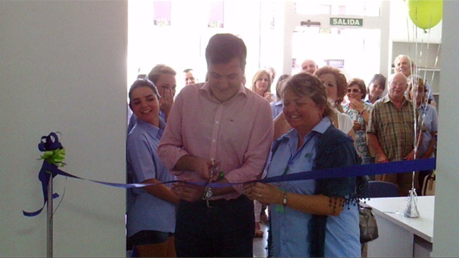New company profile: Centre of Studies Escobar

Have you ever thought about teaching abroad? There are of course two ways you can approach this, either you can join an international school or start your own
language school.
Well Paul Clarke and Sue Humphrey did the later, but not without a few problems along the way. We sent our roving reporter to find out more. Read on to find out how they went about building, what is now, a very successful language academy.
Tell me Paul what is your background, how does one get started in this type of teaching?
Well we are both from very different backgrounds, mine is pure education. Primary education degree, masters degree, headship etc. However, Sue’s background is quite different. She came to teaching through IT and a very successful international career. Having moved to Spain, she needed to earn a living, so did a CELTA with Cambridge in Serville. So you can see very different backgrounds, but both with a determination to succeed.
So Sue, how did it all get started?
In brief. I was living in Spain doing a lot of interpreting and a little teaching on a self employed basis. Paul came over to visit his family, one of my clients. He was looking for a change of scene, and we got together. We did not set out to build an academy and after an uncertain year Paul got a job at Kings College Murcia. We had been teaching on a small scale but not enough to make ends meet and Paul´s job gave us the security of a regular income. So I guess we are grateful to them for giving us the impetus to have a go at developing our own business, properly.
We originally developed the business to teach English, but we quickly found that Paul was in demand from those children needing help in international schools. We also discovered that a lot of people from other countries needed Spanish classes, not just the British community here in Murcia but also other nationalities too. We currently offer classes in Spanish delivered by native Spanish speakers as well as English teachers with a high level of Spanish.
So you now have these beautiful purpose built premises but surely it wasn’t always like this, Paul?
No, not at all, we started at home in a converted bedroom and the dining room. I quickly discovered that teaching a foreign language is nothing like primary education. Students want the opportunity to speak and they want to hear a native speaker. That has probably been the greatest lesson we learnt early on, native speakers, for us are crucial. We then went from two teachers
to needing six new teachers in about 4 weeks. From there the business just grew and grew.
Eventually we realised we needed new premises. One day, Paul was waiting for me after finishing a class in a local secondary school. There had been a bookshop on the corner near to the school for many years, but it had moved, some years ago. So we decided to take it. 6 months later we needed bigger premises and 12 months after that we had to double the size again.
The business continued to grow, incorporating, German, French, Spanish and then apoyo, help for children with difficulties in other subjects. We began to establish some rules for the business. This is not the conventional way to do things, as any business guru would tell you. First you start with a business plan, goals, finance etc. We didn’t do that our academy grew organically.
Then, to our surprise, at the start of 2015 the landlord of that first shop offered to build a purpose built academy for us. Having equipped the academy, we opened on 1st October 2016, with about 600 students of all ages and abilities.
So what is the secret to building this type of business, if there is one?
I think the first thing is to understand you clients needs, whether you do this through a survey and traditional research or like us you get to know the real people who you are going to work with and build a local reputation for good work. It is also essential to be qualified, at least a 120 hour TEFL, linking up with your local Cambridge exam centre is also useful. Finally don’t try to undercut the competition, look at other local academies and see how much they are charging for classes, it is probably the minimum that it is possible to charge.
The other thing is to do it legally. Don’t think that you can do a little teaching from home and be OK. If it grows in reputation, you will get caught and the fines are substantial. Get a good accountant and follow their advice.
If you are interested in
Spanish classes or have a child at an international school contact Paul paul@csemurcia.com
If you are interested in other language classes, English, French or German, or your child needs Apoyo for a Spanish school please contact Sue, sue@csemurcia.com
Or simply visit their website, www.csemurcia.com

 Spanish
Spanish German
German Dutch
Dutch